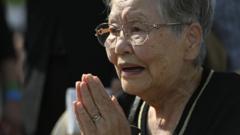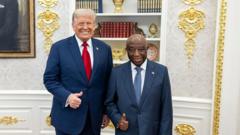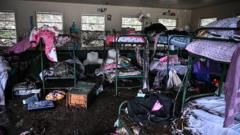The city of Hiroshima recently marked the 80th anniversary of the atomic bombing, an event that left an indelible scar on the world’s history.
Hiroshima Commemorates 80 Years Since Atomic Bombing

Hiroshima Commemorates 80 Years Since Atomic Bombing
Japan observes a somber anniversary as it reflects on the devastating impacts of nuclear warfare.
On Wednesday morning, Japan held a poignant ceremony to commemorate the 80 years since the atomic bombing of Hiroshima. Attendees included Japanese Prime Minister Shigeru Ishiba, Hiroshima’s mayor Kazumi Matsui, and representatives from nations across the globe. The ceremony featured a moment of silence to honor the memory of the over 200,000 lives lost due to the bombing and its aftermath through radiation sickness and burns.
Mayor Matsui, during his address, cautioned against an "accelerating trend toward military build-up" and emphasized a growing belief in the necessity of nuclear weapons for national security. He argued that such views represent a blatant disregard for the harrowing lessons that should have emerged from historical tragedies. As World War II came to a close with Japan's surrender following the bombings, the shadow of nuclear weaponry continues to loom over present-day discussions.
Survivors like Shingo Naito, who tragically lost his family to the devastating attack, continue to share their stories in an effort to educate future generations. In a heart-wrenching narrative, Naito recounted the physical scars left on his father and the emotional scars etched in his memory. Alongside students in Hiroshima, he is transforming his painful recollections into expressive art, fostering a vital dialogue about the horrors of war.
In a related achievement, the atomic bomb survivor group Nihon Hidankyo was awarded the Nobel Peace Prize in 2024 for their advocacy against nuclear arms. Mayor Matsui called for Japan to endorse the Treaty on the Prohibition of Nuclear Weapons, introduced in 2021, highlighting its significance while acknowledging challenges posed by nuclear powers like the US and Russia that discount the treaty's effectiveness.
As activists took to the streets outside the Peace Memorial Park, the demanding call for disarmament echoed through the city. Emotionally charged, survivor Satoshi Tanaka reflected on the ongoing capacity for conflict, linking the memories of Hiroshima to the violent scenes emerging from contemporary crises in Gaza and Ukraine. He expressed the urgent need for a collective outcry against the persisting threat of nuclear weapons, underlining the necessity for action from global leaders in the nuclear arena.
As Japan grapples with these memories and the current geopolitical climate, the legacy of Hiroshima continues to inspire a global conversation about peace and the urgent need for nuclear disarmament.
Mayor Matsui, during his address, cautioned against an "accelerating trend toward military build-up" and emphasized a growing belief in the necessity of nuclear weapons for national security. He argued that such views represent a blatant disregard for the harrowing lessons that should have emerged from historical tragedies. As World War II came to a close with Japan's surrender following the bombings, the shadow of nuclear weaponry continues to loom over present-day discussions.
Survivors like Shingo Naito, who tragically lost his family to the devastating attack, continue to share their stories in an effort to educate future generations. In a heart-wrenching narrative, Naito recounted the physical scars left on his father and the emotional scars etched in his memory. Alongside students in Hiroshima, he is transforming his painful recollections into expressive art, fostering a vital dialogue about the horrors of war.
In a related achievement, the atomic bomb survivor group Nihon Hidankyo was awarded the Nobel Peace Prize in 2024 for their advocacy against nuclear arms. Mayor Matsui called for Japan to endorse the Treaty on the Prohibition of Nuclear Weapons, introduced in 2021, highlighting its significance while acknowledging challenges posed by nuclear powers like the US and Russia that discount the treaty's effectiveness.
As activists took to the streets outside the Peace Memorial Park, the demanding call for disarmament echoed through the city. Emotionally charged, survivor Satoshi Tanaka reflected on the ongoing capacity for conflict, linking the memories of Hiroshima to the violent scenes emerging from contemporary crises in Gaza and Ukraine. He expressed the urgent need for a collective outcry against the persisting threat of nuclear weapons, underlining the necessity for action from global leaders in the nuclear arena.
As Japan grapples with these memories and the current geopolitical climate, the legacy of Hiroshima continues to inspire a global conversation about peace and the urgent need for nuclear disarmament.






















